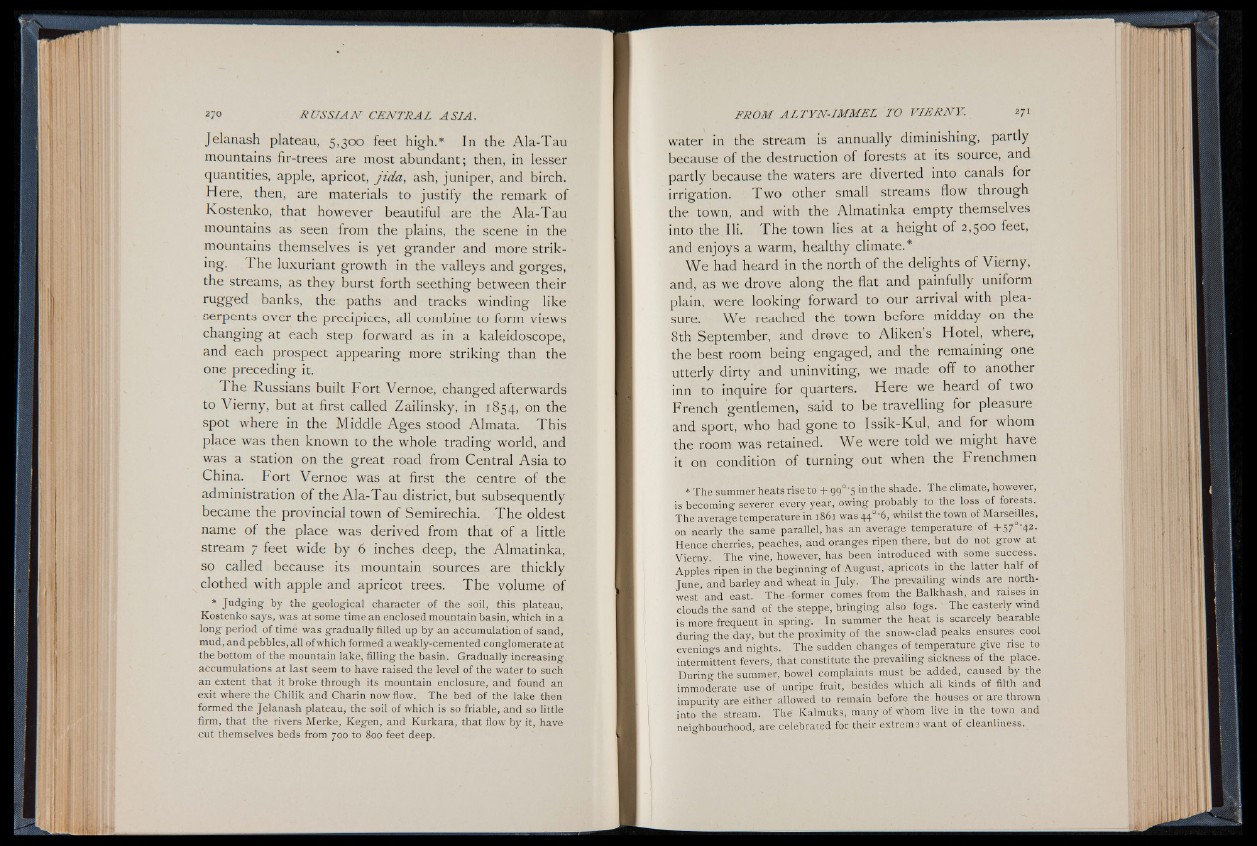
Jelanash plateau, 5,300 feet high.* In the Ala-Tau
mountains fir-trees are most abundant; then, in lesser
quantities, apple, apricot, jid a , ash, juniper, and birch.
Here, then, are materials to justify the remark of
Kostenko, that however beautiful are the Ala-Tau
mountains as seen from the plains, the scene in the
mountains themselves is yet grander and more striking
The luxuriant growth in the valleys and gorges,
the streams, as they burst forth seething between their
rugged banks, the paths and tracks winding like
serpents over the precipices, all combine to form views
changing at each step forward as in a kaleidoscope,
and each prospect appearing more striking than the
one preceding it.
T he Russians built Fort Vernoe, changed afterwards
to Vierny, but at first called Zailinsky, in 1854, on the
spot where in the Middle Ages stood Almata. This
place was then known to the whole trading world, and
wTas a station on the great road from Central Asia to
China. Fort Vernoe was at first the centre of the
administration of the A la-Tau district, but subsequently
became the provincial town of Semirechia. The oldest
name of the place was derived from that of a little
stream 7 feet wide by 6 inches deep, the Almatinka,
so called because its mountain sources are thickly
clothed with apple and apricot trees. The volume of
* Judging by the geological character of the soil, this plateau,
Kostenko says, was at some time an enclosed mountain basin, which in a
long period of time was gradually filled up by an accumulation of sand,
mud, and pebbles, all ofwhich formed a weakly-cemented conglomerate at
the bottom of the mountain lake, filling the basin. Gradually increasing
accumulations at last seem to have raised the level of the water to such
an extent that it broke through its mountain enclosure, and found an
exit where the Chilik and Charin now flow. The bed of the lake then
formed the Jelanash plateau, the soil of which is so friable, and so little
firm, that the rivers Merke, Kegen, and Kurkara, that flow by it, have
cut themselves beds from 700 to 800 feet deep.
water in the stream is annually diminishing, partly
because of the destruction of forests at its source, and
partly because the waters are diverted into canals for
irrigation. Two other small streams flow through
the town, and with the Almatinka empty themselves
into the Ili. The town lies at a height of 2,500 feet,
and enjoys a warm, healthy climate.*
We had heard in the north of the delights of Vierny,
and, as we drove along the flat and painfully uniform
plain, were looking forward to our arrival with pleasure.
We reached thé town before midday on the
8th September, and drove to Aliken’s Hotel, where,
the best room being engaged, and the remaining one
utterly dirty and uninviting, we made off to another
inn to inquire for quarters. Here we heard of two
French gentlemen, said to be travelling for pleasure
and sport, who had gone to Issik-Kul, and for whom
the room was retained. We were told we might have
it on condition of turning out when the Frenchmen
* The summer heats rise to + 99° ‘5 in the shade. The climate, however,
is becoming severer every year, owing probably to the loss of forests.
The average temperature in 1861 was 440 "6, whilst the town of Marseilles,
on nearly the same parallel, has an average temperature of 4-57° -42.
Hence cherries, peaches, and oranges ripen there, but do not grow at
Vierny. The vine, however, has been introduced with some success.
Apples ripen in the beginning of August, apricots in the latter half of
June, and barley and wheat in July. The prevailing winds are northwest
and east. The.dormer comes from the Balkhash, and raises in
clouds the sand of the steppe, bringing also fogs. ' The easterly wind
is more frequent in spring. In summer the heat is scarcely bearable
during the day, but the proximity of the snow-clad peaks ensures cool
evenings and nights. The sudden changes of temperature give rise to
intermittent fevers, that constitute the prevailing sickness of the place.
During the summer, bowel complaints must be added, caused by the
immoderate use of unripe fruit, besides which all kinds of filth and
impurity are either allowed to remain before the houses or are thrown
into the stream. The' Kalmuks, many of whom live in the town and
neighbourhood, are celebrated for their extreme want of cleanliness.